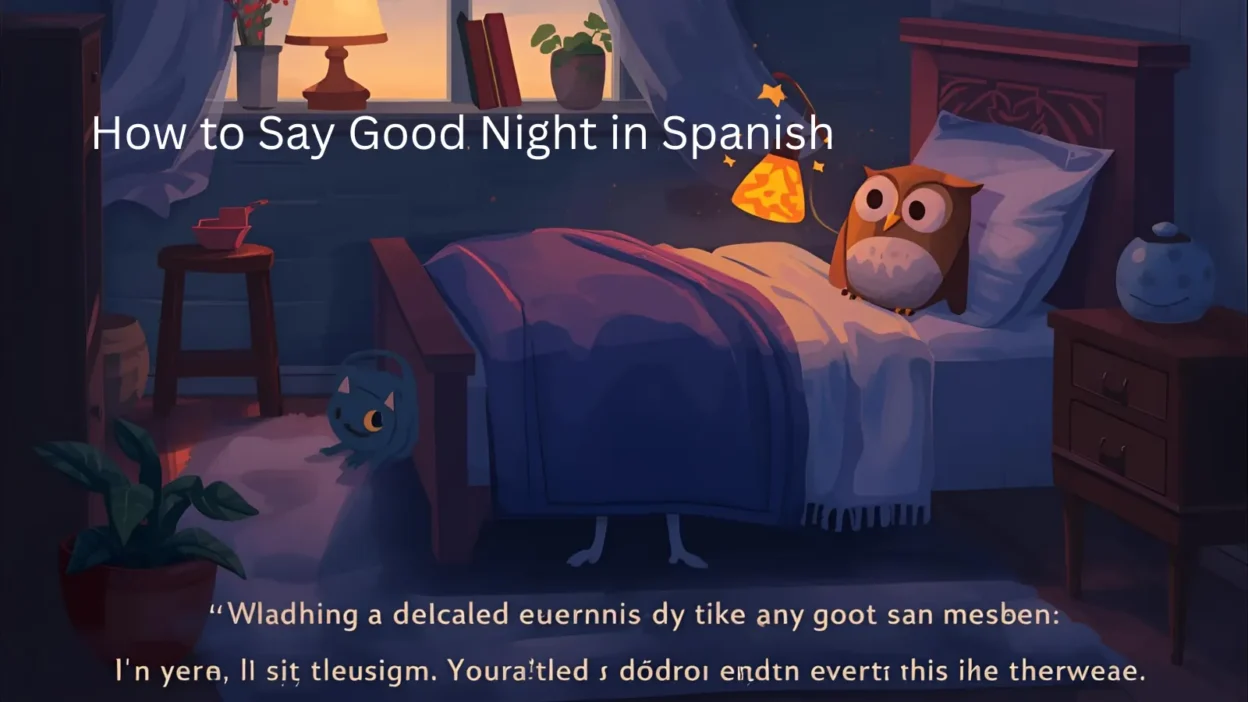How to Say Good Night in Spanish is a useful phrase for ending the day with warmth and politeness. The most common expression is “Buenas noches,” which can be used both as a greeting in the evening and as a way to wish someone a restful night.
You can also make it more affectionate with phrases like “Que descanses” (rest well) or “Dulces sueños” (sweet dreams). Learning these variations helps you sound caring and natural in Spanish conversations.
Say Good Night in Spanish
Let’s explore 15 unique ways to say good night in Spanish, complete with example dialogues and the origin or cultural background of each phrase.
15 Ways to Say Good Night in Spanish
| # | Spanish Phrase | English Meaning |
|---|---|---|
| 1 | Buenas noches | Good night |
| 2 | Que descanses | Rest well |
| 3 | Dulces sueños | Sweet dreams |
| 4 | Que duermas bien | Sleep well |
| 5 | Feliz noche | Happy night |
| 6 | Que sueñes con los angelitos | Dream of the little angels |
| 7 | Hasta mañana | See you tomorrow |
| 8 | Que tengas una linda noche | Have a lovely night |
| 9 | Que tu noche sea tranquila | May your night be peaceful |
| 10 | Buenas noches, mi amor | Good night, my love |
| 11 | Que sueñes conmigo | Dream of me |
| 12 | Descansa, cariño | Rest well, darling |
| 13 | Pasa una buena noche | Have a good night |
| 14 | Que tengas dulces sueños | May you have sweet dreams |
| 15 | Buenas noches y que Dios te bendiga | Good night and God bless you |
1. Buenas noches – Good night

Origin:
This is the standard and most widely used way to say “good night” in Spanish-speaking countries.
Example:
👤 User A: Buenas noches, mamá.
👤 User B: Buenas noches, cariño. Que descanses.
Use: Universal; appropriate in all situations—formal, informal, and affectionate.
2. Que descanses – May you rest
Origin:
A tender, well-wishing phrase often said before bedtime, showing care for the other person’s well-being.
Example:
👤 User A: Me voy a dormir.
👤 User B: Que descanses. Nos vemos mañana.
Use: Informal and caring; used with family or close friends.
3. Dulces sueños – Sweet dreams

Origin:
Similar to its English counterpart, it’s a warm and affectionate phrase often said to children or romantic partners.
Example:
👤 User A: Buenas noches, mi amor.
👤 User B: Dulces sueños, corazón.
Use: Very affectionate; used with loved ones.
4. Hasta mañana – See you tomorrow
Origin:
Literally meaning “until tomorrow,” this phrase is a hopeful goodbye used at the end of the night.
Example:
👤 User A: Ya me voy. Hasta mañana.
👤 User B: ¡Hasta mañana! Que duermas bien.
Use: Friendly and common; works in most casual situations.
5. Que sueñes con los angelitos – May you dream of little angels

Origin:
A traditional Spanish bedtime wish, especially for children, used in many Latin American homes.
Example:
👤 User A: Ya es hora de dormir, mi niño.
👤 User B: ¿Me dices que sueñe con los angelitos?
👤 User A: Claro que sí. Que sueñes con los angelitos.
Use: Very sweet; mostly for kids.
6. Descansa bien – Rest well
Origin:
A gentle and thoughtful way of expressing that someone deserves a peaceful rest.
Example:
👤 User A: Estoy agotado. Me voy a la cama.
👤 User B: Descansa bien. Te lo mereces.
Use: Relaxed and kind; used between friends, partners, or family.
7. Nos vemos mañana – See you tomorrow
Origin:
Common phrase in Spain and Latin America for ending the night with a promise of reconnection.
Example:
👤 User A: Me voy. Nos vemos mañana.
👤 User B: Sí, que duermas bien.
Use: Everyday; neutral and friendly.
8. Que tengas buenas noches – Hope you have a good night
Origin:
More complete and formal version of “buenas noches,” often used to show extra politeness.
Example:
👤 User A: Fue un placer conocerte.
👤 User B: Igualmente. Que tengas buenas noches.
Use: Formal or polite; perfect for new acquaintances or professional settings.
9. Hasta mañana si Dios quiere – Until tomorrow, God willing
Origin:
Traditional in many religious Latin American households, showing faith and hope for tomorrow.
Example:
👤 User A: Me voy a dormir, abuela.
👤 User B: Hasta mañana si Dios quiere, mi niño.
Use: Religious and affectionate; common with elders or in religious families.
10. A dormir se ha dicho – Time to sleep (Let’s go to bed)
Origin:
A fun and slightly playful way to say it’s bedtime, popular in everyday family life.
Example:
👤 User A: ¿Ya tan temprano?
👤 User B: ¡A dormir se ha dicho!
Use: Informal, often humorous; good for kids or casual conversation.
11. Que la pases bien esta noche – Hope you enjoy your night
Origin:
Used more when someone is going out at night or spending time elsewhere.
Example:
👤 User A: Me voy a una fiesta.
👤 User B: Que la pases bien esta noche. ¡Diviértete!
Use: Evening events; polite and friendly.
12. A descansar – Time to rest
Origin:
A brief but kind phrase often said before sleep, like a gentle command or suggestion.
Example:
👤 User A: ¿Seguimos estudiando?
👤 User B: No, ya basta. A descansar.
Use: Everyday; calm and caring.
13. Cuídate esta noche – Take care tonight

Origin:
A modern variation showing concern, especially if someone is out late.
Example:
👤 User A: Me voy a casa.
👤 User B: Cuídate esta noche. Buenas noches.
Use: Protective and friendly.
14. Feliz noche – Have a happy night
Origin:
Less common than “buenas noches,” but poetic and warm, especially in written form or romantic settings.
Example:
👤 User A: Te mando un mensaje antes de dormir.
👤 User B: Gracias, amor. Feliz noche.
Use: Romantic or poetic tone.
15. Que el Señor te bendiga esta noche – May the Lord bless you tonight
Origin:
A deeply spiritual wish, common in traditional or religious families in Latin America.
Example:
👤 User A: Buenas noches, mamá.
👤 User B: Que el Señor te bendiga esta noche, hijo.
Use: Religious; respectful and heartfelt.
FAQs
1. What is the most common way to say Good Night in Spanish?
The most common phrase is “Buenas noches.” It is used in all situations — formal and informal.
2. Can “Buenas noches” mean both Good Night and Good Evening?
Yes. Buenas noches can mean Good Evening and Good Night, depending on the time and context.
3. How do I say Good Night to a friend casually?
You can simply say: “Buenas noches” or “Que descanses” (meaning: Rest well).
4. How do I say Good Night romantically?
Use: “Dulces sueños” (Sweet dreams) or “Que tengas sueños bonitos” (Have beautiful dreams).
5. How do I say Good Night to a group of people?
Say: “Buenas noches a todos” which means Good night to everyone.
6. How do I say Sleep Well in Spanish?
You can say: “Duerme bien.”
7. Is “Buenas noche” correct?
No. The correct form is “Buenas noches” (with s) because noches is plural.
8. How do I say Good Night politely?
Use: “Que tenga una buena noche.” (Have a good night).
Used for teachers, elders, or formal situations.
9. How do I say Good Night over text?
Text-friendly phrases include:
- “BN” (short for Buenas noches)
- “Dulces sueños 😊”
10. How do I say Good Night in a cute or affectionate way?
Say: “Buenas noches, cariño.” (Good night, dear/sweetheart).
Conclusion:
How to Say Good Night in Spanish is most commonly expressed with “Buenas noches,” but there are many warm variations like “Que descanses” or “Dulces sueños.” These phrases allow you to end the day politely, lovingly, or even romantically depending on the situation. By learning them, you’ll connect more naturally and warmly with Spanish speakers.



